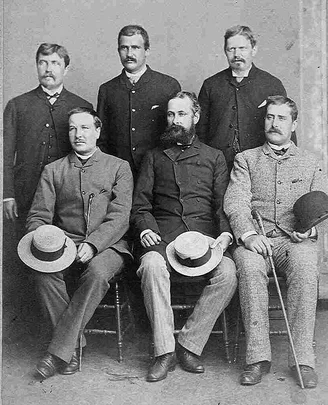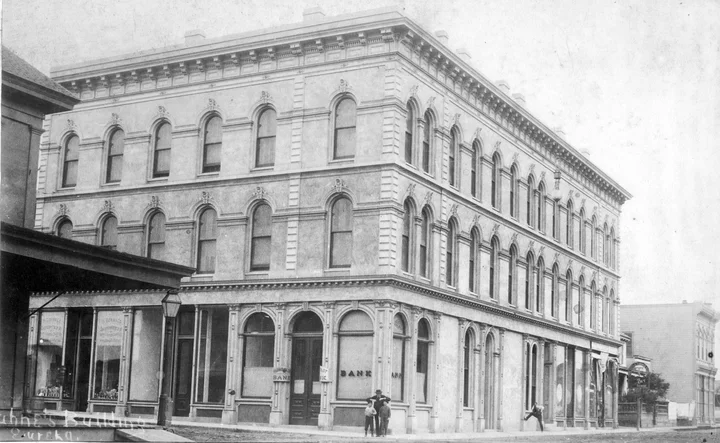
The six survivors of the Greely Arctic Expedition. Back: Fredericks, Connell, Long. Front: Biederbick, Greely, Brainard. Circa 1885.
In 1888, Maurice Connell was appointed observer
at the Eureka weather station, located in the Buhne
building at Second and G streets. Connell had gained
his appointment to Eureka’s station as a result of
his participation in the ill-starred Lady Franklin Bay Polar Expedition, more commonly known as
the Greely Expedition, which had been marked by
governmental dysfunction and by rumors of bizarre
and even gruesome circumstances.
Maurice Connell was born in Ireland and immigrated to the United States in 1864 at the age of twelve. He lived with an uncle in New York until 1869. His desire for adventure took him to many new and foreign places, including Panama, South America, California, and finally to San Francisco where he enlisted in the United States cavalry. His military service lasted ten years, during which he fought in several Indian battles. During that time he was promoted from the rank of private to sergeant. In 1881 Connell resigned his rank as sergeant and joined the Greely Expedition led by Lieutenant Adolphus Greely. The team set out from Greenland on the steamship Proteus on July 7, 1881.
The expedition’s ostensible purpose, as publicly stated, was to possibly discover and rescue members of the Jeanette, a previous expedition that had not been heard from and was presumed lost. In reality, its other and undisclosed purpose was to reach a point farther north toward the North Pole than had been reached by Britain, thus breaking the polar exploration record that had been held by Great Britain for three hundred years. The Greely party was successful in achieving that goal for the United States. The twenty-five-member expedition, however, was poorly prepared for the ordeal that lay before it. None of the group had any polar exploration experience, and personality conflicts, inadequate supplies, and complaints of rigid and inflexible leadership were contributing factors that led to unbelievable hardship and suffering, and the death of nineteen members of the party.
As previously planned, a government resupply ship was sent to the Greely party in 1882, but failed to reach it, as did another attempt in 1883. The Greely group, without needed supplies, was hopelessly stranded at a point called Cape Sabine, and although it was successful in its goal of achieving polar exploration supremacy, the members of the expedition now had but one mission: survival.
Meanwhile, back in Washington, D.C., officials convened an investigation into why both resupply missions, each with supplies for one year, had failed. After considerable political infighting, a third rescue ship was launched in August 1884. This rescue mission succeeded and the members of the Greely party were brought home.
There were six survivors of the ill-fated venture, among them Maurice Connell.
The investigation revealed that much of the blame for the unsuccessful 1882 and 1883 rescue attempts lay with the Secretary of War, Robert Todd Lincoln, son of the late President Lincoln, because of his lack of interest in polar exploration and his refusal to provide needed funds for the rescue parties.
In spite of Lieutenant Greely’s attempt, as leader of the expedition, to cover up many details that led to the men’s desperate fight for their lives, Washington was shocked at what was disclosed. Further investigation brought to light not only harsh criticism of Lieutenant Greely’s leadership style, but also the execution of one of the party for stealing food, the questionable death of the group’s medical officer, and what was regarded as most shocking of all, acts of cannibalism.
All but one of the other five survivors swore they had no knowledge of what the investigation discovered, and remained loyal to their cause. Maurice Connell was that lone dissenter.
In 1885 Connell transferred from the U.S. Cavalry to the Signal Corps and in 1888 was serving as an assistant weather observer in San Francisco. He had long believed that he should be promoted from private second class to the rank of sergeant and, apparently, realized he had a way to achieve that. In a letter to Lieutenant Greely, Connell wrote, “If you are aware of the pressure brought upon me to talk on certain subjects and which I’ve so far resisted, you would think differently of my conduct.” Connell threatened to speak out and to even write a book about the extreme hardships, suffering, starvation, and the unimaginable challenge to the human spirit endured by the members of the Greely party if Lieutenant Greely did not see that he received his promotion.
And in a short time he was promoted to private first class, and then to sergeant. That wasn’t all that Connell wanted. He wanted a transfer to the weather station in Eureka because it was, as he said, “an easy station and a good climate.”
Maurice Connell was the last observer in the Signal Corps to man Eureka’s weather station. During his tenure there, he married Hettie L. Bast of Eureka, a teacher at the Eureka Academy.
Lieutenant Greely, with help from influential government officials, was successful in keeping much information concerning the tragic fate of the Greely Expedition from the general public, and as a result one could assume that the residents of Eureka had no knowledge of Maurice Connell’s adventurous but tragic and possibly even gruesome background, or that it was blackmail that brought him to Eureka.
The Buhne Building at Second and G Streets. Photo via the Humboldt Historian.
###
NOTE: The author of this story, Mary Dawn Cunningham, passed away last month.
###
The story above was originally printed in the Summer 2015 issue of the Humboldt Historian, a journal of the Humboldt County Historical Society. It is reprinted here with permission. The Humboldt County Historical Society is a nonprofit organization devoted to archiving, preserving and sharing Humboldt County’s rich history. You can become a member and receive a year’s worth of new issues of The Humboldt Historian at this link.

CLICK TO MANAGE